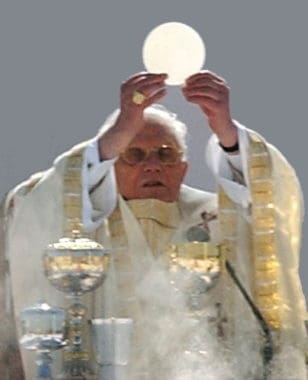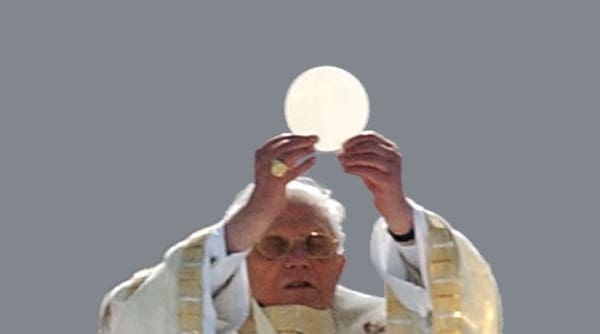Corpus Christi
The Solemnity of the Most Holy Body and Blood of Christ
 In today’s solemnity (which was celebrated last Thursday, May 26th in some locations), we honor the most holy Body and Blood of Christ. This feast was promoted by St. Juliana of Liège (also known as St. Juliana of Cornillon), who lived between 1191/2 and 1258, an Augustinian nun in charge of a leper colony. Jesus appeared to her at the age of 16 and told her to plead for the establishment of this feast, in order to promote the adoration of the Eucharist, to increase faith and virtue, and to atone for offenses against the Blessed Sacrament. This vision continued for 20 years, kept secret until she revealed it and submitted it to her confessor for his discernment. It was first approved locally, and then finally established for the entire Church in 1264 by Pope Urban IV. Eucharistic processions were not initially part of the feast but gradually came to be included in many celebrations.
In today’s solemnity (which was celebrated last Thursday, May 26th in some locations), we honor the most holy Body and Blood of Christ. This feast was promoted by St. Juliana of Liège (also known as St. Juliana of Cornillon), who lived between 1191/2 and 1258, an Augustinian nun in charge of a leper colony. Jesus appeared to her at the age of 16 and told her to plead for the establishment of this feast, in order to promote the adoration of the Eucharist, to increase faith and virtue, and to atone for offenses against the Blessed Sacrament. This vision continued for 20 years, kept secret until she revealed it and submitted it to her confessor for his discernment. It was first approved locally, and then finally established for the entire Church in 1264 by Pope Urban IV. Eucharistic processions were not initially part of the feast but gradually came to be included in many celebrations.
Corpus Christi honors the Eucharist, the source and summit of our Catholic life in which the Body, Blood, Soul and Divinity, the whole Christ is really, truly and substantially contained (cf Catechism of the Catholic Church 1374). In the Eucharist, then, there is present in a sacramental way, under the Eucharistic species of bread and wine, Christ whole and entire, God and man (cf Compendium of the Catechism 282).
Saint Thomas Aquinas, who composed various hymns for this celebration (Pange Lingua, Tantum Ergo, O Salutaris Hostia), explained in his Summa Theologica:
“Absolutely speaking, the sacrament of the Eucharist is the greatest of all the sacraments…First of all because it contains Christ Himself substantially: whereas the other sacraments contain a certain instrumental power which is a
share of Christ’s power… that which is essentially such is always of more account than that which is such by participation.
“…This is made clear by considering the relation of the sacraments to one another. For all the other sacraments seem to be ordained to this one as to their end. For it is manifest that the sacrament of order is ordained to the consecration of the Eucharist: and the sacrament of Baptism to the reception of the Eucharist: while a man is perfected by Confirmation, so as not to fear to abstain from this sacrament. By Penance and Extreme Unction [Anointing of the Sick] man is prepared to receive the Body of Christ worthily. And Matrimony at least in its signification, touches this sacrament; in so far as it signifies the union of Christ with the Church, of which union the Eucharist is a figure: hence the Apostle says (Ephesians 5:32): ‘This is a great sacrament: but I speak in Christ and in the Church.'” (Thomas Aquinas, ST, q 65, a3 response).
Even before the establishment of this feast, many saints, many Fathers and Doctors of the Church, praised and instructed the faithful on this most holy and august Sacrament. And, many popes and saints since the establishment of the Corpus Christi feast have also extolled the glories of the Eucharist.
 In more modern days, Venerable John Paul I, when he was still Bishop Albino Luciani in 1963, listed and expounded on seven ways to honor the Eucharist: Holy Mass, Holy Communion, spiritual Communion, Benediction of the Blessed Sacrament, visiting the Blessed Sacrament, Eucharistic procession and Viaticum (from The Smiling Pope by Raymond and Lauretta Seabeck). Blessed Paul VI wrote an encyclical on the Eucharist titled Mysterium Fidei and Saint John Paul II wrote one called Ecclesia de Eucharistia. As well, Cardinal Ratzinger wrote the book God is Near Us: The Eucharist, the Heart of Life, and went on to write Sacramentum Caritatis as Supreme Pontiff. We can be absolutely sure that, when the Papal Magisterium pronounces on something over and over again, it is at the heart of what we believe.
In more modern days, Venerable John Paul I, when he was still Bishop Albino Luciani in 1963, listed and expounded on seven ways to honor the Eucharist: Holy Mass, Holy Communion, spiritual Communion, Benediction of the Blessed Sacrament, visiting the Blessed Sacrament, Eucharistic procession and Viaticum (from The Smiling Pope by Raymond and Lauretta Seabeck). Blessed Paul VI wrote an encyclical on the Eucharist titled Mysterium Fidei and Saint John Paul II wrote one called Ecclesia de Eucharistia. As well, Cardinal Ratzinger wrote the book God is Near Us: The Eucharist, the Heart of Life, and went on to write Sacramentum Caritatis as Supreme Pontiff. We can be absolutely sure that, when the Papal Magisterium pronounces on something over and over again, it is at the heart of what we believe.
Over all these many years, Christ, who is the Way, the Truth and the Life, and who cannot deny himself (cf 2 Timothy 2:13), has remained faithful to what He promised, “Behold, I am with you always, even unto the end of the age” (Matthew 28:20). He is the same yesterday, today and tomorrow. What a marvelous and singular gift He has given us: Jesus Himself, the Gift par excellence by which we become more and more conformed to Him, who saved us and opened for us the doors to eternal life.
And so, let us visit and adore Our Lord often in the Blessed Sacrament. And, along with the Church, let us pray the antiphon O Sacrum Convivium (O Sacred Banquet) for the Magnificat at Evening Prayer, or Vespers, for today’s solemnity, which was written by St. Thomas Aquinas (as found in the Liber Usualis) — in Latin and in English below:
O sacrum convivum!
in quo Christus sumimtur:
recolitur memoria passionis eius:
mens impletur gratia:
et futurae gloriae nobis pignus datur.
Alleluia.
+
O sacred banquet,
in which Christ is received,
the memory of His Passion is renewed,
the mind is filled with grace,
and a pledge of future glory is given to us.
Alleluia.
+
Happy and Blessed Solemnity to one and all!
+
Art: Juliana von Lüttich (Juliana of Liège-Catholic Parish Church of St. Gordian and Epimachus, Merazhofen, city of Leutkirch im Allgäu, Ravensburg, The Choir Stalls), Peter Paul Metz, 1896, photo by Andreas Praefcke, May 2009, CCA; Monstrance (a rare early example, as monstrances for the Host became popular only after the establishment…of the Feast of the Holy Sacrament (Corpus Christi), dedicated to the Host), Mosan Workshop, circa 1230, PD-US author’s life plus 100 years or less; Detail from Canonization ceremony of Brazilian Friar Frei Galvão celebrated by Pope Benedict XVI at the Campo de Marte, in Sao Paulo, Brazil, Fabio Pozzebom/ABr, 11 May 2007, CCA; all Wikimedia Commons.




